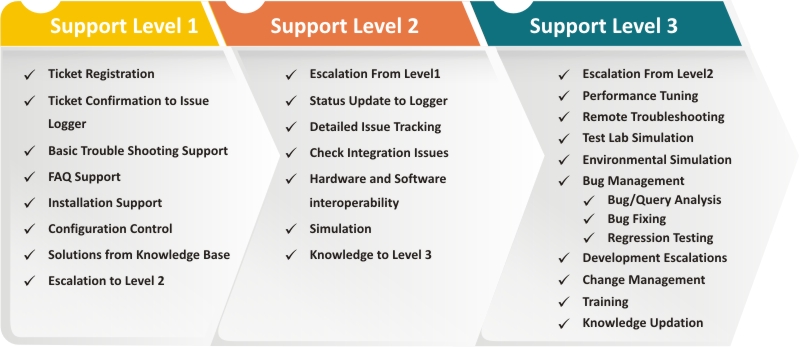 |
L1 – First Line Support
Telephone helpdesk or answer center support This support level receives inbound requests through channels like phone, Web forms, email, chat, or other means based on the documented agreement with the Client. L1 support typically includes individuals that have very limited technical expertise. L1 support logs, categorizes, prioritizes, tracks, and routes (i) incidents reported by users or (ii) alarms raised by monitoring tools. L1 is intended to be the first to acknowledge an incident. L1 support tracks tickets until successfully resolved. L1 engineers can implement basic, documented break-fix tasks along the lines of following a cookbook recipe. L1 personnel will typically escalate to an L2 resource and follow documented escalation procedures, again, like following a cookbook recipe. Depending on the vendor, L1 technicians will have from 0 to 4 years of prior relevant experience. At Appnomic, L1 engineers generally have at least 2 years of prior
relevant experience.
L2 – Second Line Support
These technicians have more experience than L1 support technicians and manage incidents raised by the L1s or as agreed in documented SLA (Service Level Agreement) timelines. L2 technicians follow documented processes and workflows provided by Clients or higher level support representatives, vendors, product management, etc. They are expected to escalate to the L3’s when documentation is insufficient to complete the tasks or do not solve the incident. L2s usually have and maintain a Run-Book which they can use for immediate resolutions. They collaborate with any other support or dependency groups in case the incident has a linkage to other support personnel or outside vendors. L2 engineers will typically escalate to an L3 resource and follow documented escalation procedures. At Appnomic, L2 engineers generally have 4 or more years of experience on a specific technology platform (e.g., Windows servers, Oracle Database, etc.).
L3 – Third Line Support
L3 technical experts resolve issues that are typically difficult or subtle. L3 engineers participate in management, prioritization, minor enhancements, break fix activities, problem management, stability analysis, etc. These support leaders have specific, deep understanding and expertise in one or two technology platforms (for example, an Oracle database administrator or a Windows Admin). L3 engineers are proactive in nature, identifying problems in advance and looking for continuous service improvement opportunities. If a fix involves a major enhancement or a development, then the problem is transferred to engineering or development teams, Level 4. L3 engineers may have root or administrator access to basic systems. Appnomic L3 engineers generally have 8 or more years of relevant experience. |